The Hills
Youth Programme
At The Hills, we understand that being a young adult comes with its own set of challenges. Whether it’s the pressures of school, work, or figuring out who you are, life can sometimes feel overwhelming. That’s why our rehab youth programme is designed for individuals aged 18 and older, offering the support needed to face these challenges and build a healthier future.
We believe recovery isn’t just about overcoming immediate struggles—it’s about finding balance, building confidence, and gaining the tools to navigate life’s ups and downs. Our program provides a safe space for healing while helping young adults prepare for the next phase of their journey.
For Parents: Why Choose The Hills for Your Child?
As a parent, seeing your child struggle can be incredibly difficult. You want to do everything in your power to help them get back on track. Our rehab youth programme at The Hills is designed not only to help young adults recover but to guide them toward a brighter, more stable future. We offer a caring, structured environment where they can receive the specialized support they need.
Many parents choose The Hills because:
- We Focus on Growth, Not Just Recovery: Our goal is to help your child develop the skills they need for long-term success. From emotional regulation to independent living, we provide practical tools that go beyond short-term treatment.
- Holistic Care: We address the whole person—mind, body, and spirit. This well-rounded approach ensures your child is not only healing emotionally but also building a healthy, balanced lifestyle.
- Personalized Treatment: Every young adult is different, and so is their treatment. Our team works closely with your child to create a plan that meets their unique needs, addressing the specific pressures and challenges they’re facing at this stage in life.
- Safe and Supportive Environment: With 24-hour nursing care and expert therapists, your child is never alone. We provide continuous support and supervision to ensure they are cared for around the clock.
If you’re searching for answers on how to get my son into rehab, rehab for my son, or you’re worried about your child’s future, don’t wait. The Hills offers a specialized drug alcohol youth service that is here to provide the help your loved one needs. Contact us today to learn how we can offer the support, guidance, and care your child deserves.
As more research highlights the increasing mental health challenges faced by young adults, it’s important to understand the current trends. For more information on rising mental health statistics and the growing need for youth support, explore this comprehensive report here.
Focus on Life Skills & Holistic Well-Being
At The Hills, we focus on more than just immediate recovery. We help young adults build the life skills they need to manage their health, stress, and future responsibilities. Whether it’s learning how to balance work or school with self-care, or gaining tools to handle tough emotions, we’re here to help them grow.
Daily Routine
We understand that seeing is believing, which is why we’ve created a video to give you a glimpse into a day in the life at The Hills. Watch how our structured yet flexible daily routine supports everyone as they work toward their personal goals, all while feeling empowered and supported
After watching, keep reading to learn more about how we design our youth inpatient rehab program to meet individual needs.
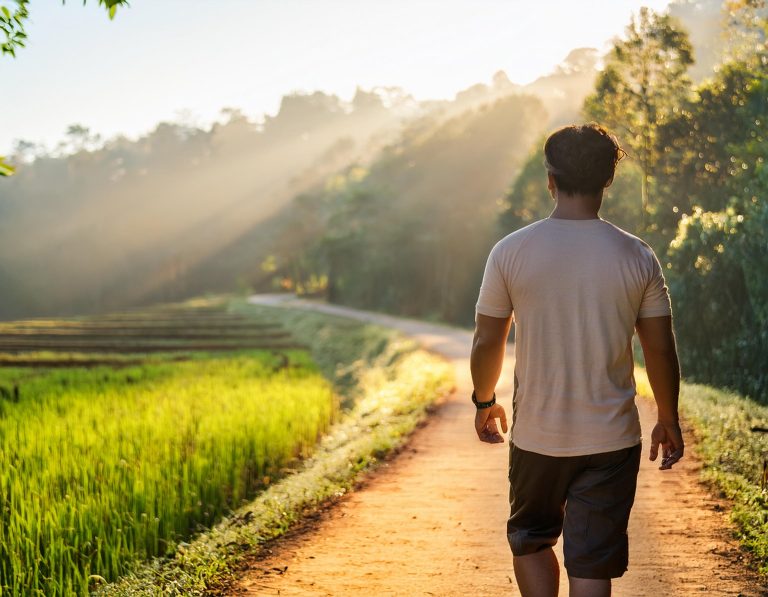
- Morning : The day starts with a walk or jog to clear the mind and get fresh air, followed by mindfulness exercises like breath work or meditation to help them manage stress and anxiety.

- Mid-Morning : Before lunch, they’ll join group sessions where they can share and connect with others going through similar challenges. Therapy sessions like CBT or DBT are also offered to help them manage negative thoughts and emotions.

- Midday: After lunch, creative outlets like Art Therapy, personal growth discussions, or engaging in Trauma Release Exercises (TRE) provide young adults with the opportunity to explore their feelings in a safe and supportive environment. Additionally, they can participate in a peaceful chat with a monk, offering a unique space for reflection and mindfulness.
- Afternoon : Personalized one-on-one sessions, like counseling, personal training, or relaxation treatments, are scheduled in the afternoons. These sessions help your child focus on their physical and emotional well-being.
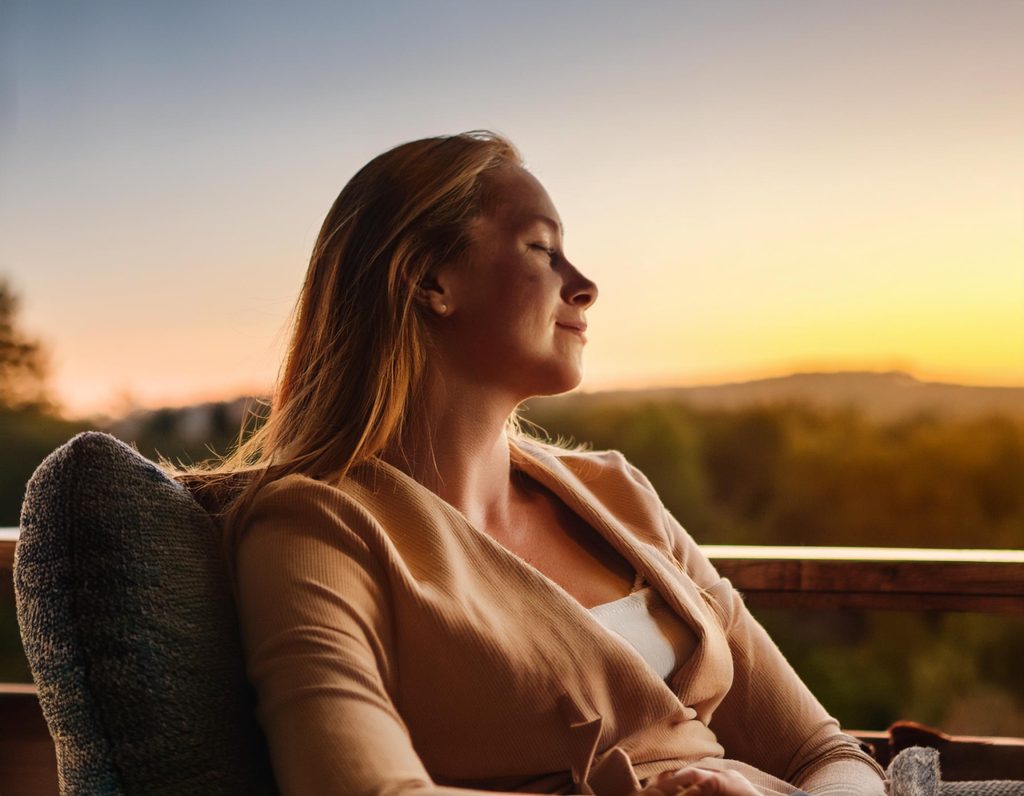
- Evening: At the end of each day, we offer time for reflection, allowing clients to process what they’ve learned and experienced. This reflection is an important part of the recovery process, helping them solidify the positive changes they are making.
Our Commitment
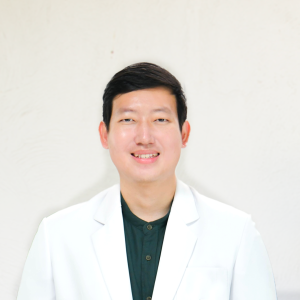
Personalized Care with a Fully Licensed Psychiatrist
From the moment they join the programme, our team works closely with each young adult to create a customized plan. Whether they’re struggling with anxiety, depression, stress from school or work, or life transitions, we’re here to guide them with care and understanding.
24-Hour Nursing Staff for Continuous Support
Your child will always have access to support. Our nursing staff is available 24/7 to ensure they feel safe, comfortable, and cared for throughout their stay.
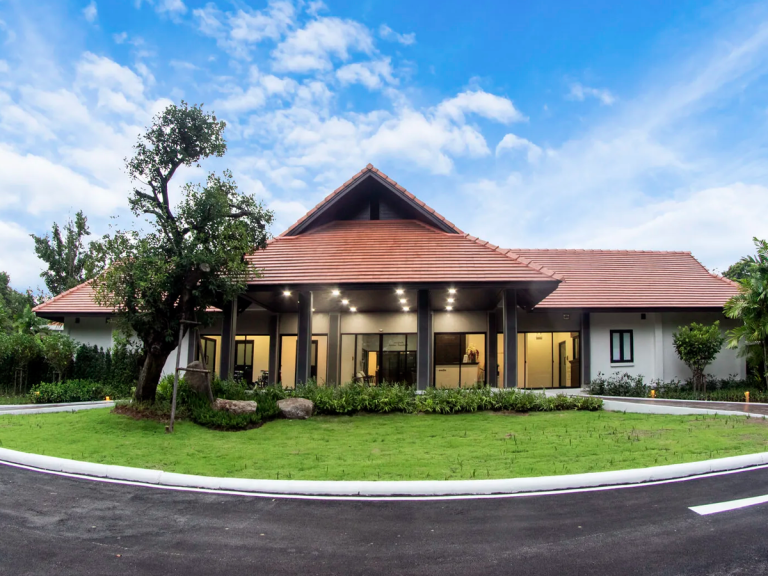

Mental Health Clinic for Medical Attention
In addition to our expert care team, we have an seperate mental health clinic ready to routinely follow up. This ensures that you receive coutinuous medical attention, making your recovery process as safe and smooth as possible.
Weekly Highlights
Throughout the week, you’ll engage in various specialized group sessions designed to support your mental health journey. These include:
CBT (Cognitive Behavioral Therapy) or DBT (Dialectical Behavioral Therapy): Depending on the day, these sessions focus on addressing the thoughts and behaviors that contribute to mental health challenges such as anxiety, depression, PTSD, or trauma. You’ll learn techniques to help manage your emotions, challenge negative thinking, and develop healthier coping mechanisms.
Holistic Treatments: Some days include sessions like Aqua Aerobics or TRE (Tension & Trauma Releasing Exercises). These holistic therapies aim to release stress and tension stored in the body, fostering a sense of calm and emotional balance. These approaches complement traditional therapies by focusing on both mental and physical well-being.
Art Therapy or Spiritual Discussions: On certain days, you’ll have the option to explore emotional healing through creative outlets like Art Therapy or engage in deeper spiritual conversations with a monk. These sessions are designed to help you process emotions and gain new insights into your mental health journey in a supportive, non-judgmental environment.
Each week, your child will participate in group sessions that focus on important life skills, like managing stress, building healthy relationships, and boosting self-esteem. These sessions are designed to help them feel more confident and prepared for life after treatment.
Weekend Activities
We understand that transitioning back into daily life can be stressful, so our weekend activities are designed to help young adults practice what they’ve learned in real-world situations:
- Saturdays: Self-care activities, like haircuts and manicures/pedicures, are offered to help them feel good about themselves and boost their confidence.
- Sundays: We take clients on outings that allow them to apply the skills they’ve learned in new environments. These experiences help them feel more confident in handling real-world situations as they prepare to transition back to everyday life.
At The Hills, every part of your day is designed not just to support your recovery here, but to equip you with the tools and routines you need to build a healthier, happier life once you return home.
Detailed Schedule Template
To give you a clearer idea of how each day is structured at The Hills, we’ve provided a detailed template of our schedule below.
Take a look at the schedule for a more in-depth look at an example of a real day-to-day routine. If you’d like more information, feel free to contact us.
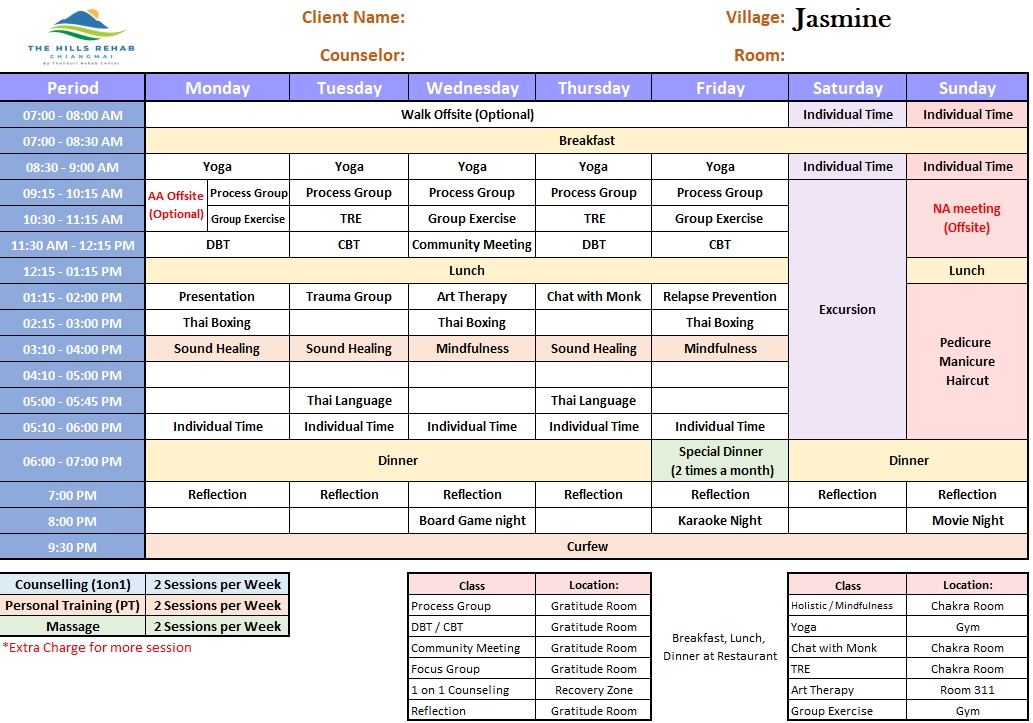
When to Seek Help
If your child has been struggling with substance use or feeling overwhelmed by life’s challenges, it’s essential to seek help. Recognizing that they need support is a critical first step toward recovery. Addiction can be particularly hard for young adults to manage alone, but a professional, structured environment can provide the guidance they need through our rehab youth programme.

